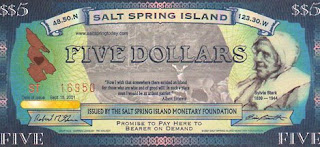
The above currency is legal currency ! Salt Spring, a Canadian Island, is an example of a local community that has its own currency. Particularly interesting is the Palmas Bank story, a successful Brazilian redevelopment project that also has its own 'local' currency.
Now, I hadnt't heard of local currency but was intrigued enough to search a couple of more sites. From what I gather, local currency is legal currency that can be used within the boundaries of that locality and is backed by either the national currency or gold/silver or a combination of these.
There are FAQ’slisted on these sites and many Q are answered. But I still wonder, how important or useful this is to a local community’s development. There is more information on the Brazilian Palmas project here and here while a couple of other communities who have their own currency are listed here and here.
Tying in last-week's post on crowd-sourcing with the first link listed above, Changemakers is another example of crowd-sourcing. The difference is that they see themselves as 'Open Sourcing Social Solutions' - a fabulous initiative of the Ashoka foundation that provides solutions and resources to become a Changemaker. Read more here.



